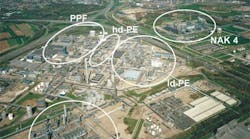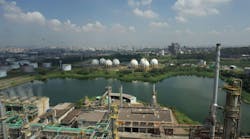WASHINGTON, DC�The US Department of Energy said Wednesday it will give Petro Star Inc., Anchorage, Alas., a contract to develop and test a biological approach to removing sulfur from diesel.
Petro Star will get $3.2 million in funding for the 3-year project. The firm and its partners will provide another $832,000.
DOE said auto and truck emissions account for nearly 40% of the nation's air pollution. In May, the Environmental Protection Agency proposed to cut the sulfur content of highway diesel fuel from 500 ppm to 15 ppm, beginning in 2006. DOE said reducing sulfur also would help catalytic converters lower other emissions.
DOE said Petro Star has proposed a biocatalytic desulfurization process that could help smaller refiners meet the standard less expensively than through hydrodesulfurization, the current standard.
The energy department said hydrodesulfurization requires expensive units to generate the large amounts of hydrogen needed for the process and to convert the remaining hydrogen sulfide gas into elemental sulfur.
DOE said, "A biocatalyst process�a system that uses selected strains of microorganisms to remove sulfur in diesel�eliminates the need for hydrogen production and the expense of operating the high-temperature, high-pressure hydrodesulfurization process.
"Nutrients for the biocatalyst can be supplied by the components of agricultural fertilizers. The nutrients that aren't consumed by the biocatalyst can be removed from the process wastewater by conventional treatment techniques."
DOE said the challenge is to develop a system in which the biological process proceeds rapidly enough to remove sulfur at commercially acceptable rates and in the presence of oil, which can inhibit the microbial action.
Petro Star has proposed to use genetically engineered microbes to boost the rate and activity of the biocatalysts. It also will design process equipment to produce a clean diesel fuel with minimal biocatalyst losses.
In the first phase, Petro Star and Enchira Biotechnology Corp., The Woodlands, Tex., will work to develop a biocatalyst that can act selectively on the sulfur compounds without degrading diesel quality.
They will use a laboratory-scale test unit that Energy BioSystems and Vogelbusch USA Inc., Anchorage, designed for Petro Star's 45,000 b/d Valdez, Alas., refinery.
In the second phase, Petro Star and engineering firms will design a 5,000 b/d demonstration plant. At the end of the project, the companies will decide whether to build and operate that plant.

